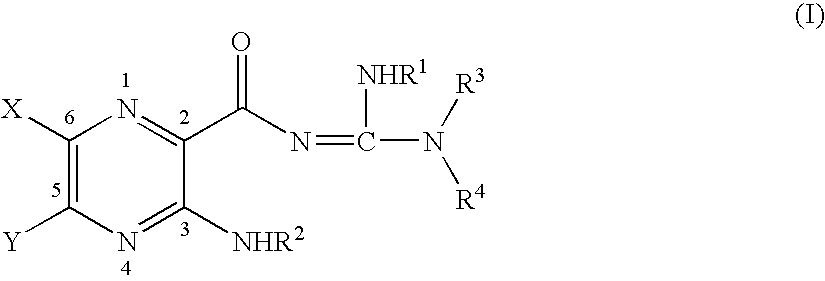Cyclic pyrazinoylguanidine sodium channel blockers
a sodium channel blocker and pyrazinoylguanidine technology, applied in the field of sodium channel blockers, can solve the problems of inability to clear mucus from airway surfaces, inability to clear mucus reflects an imbalance between the amount of liquid, and the inability to clear mucus, etc., to achieve less reversible, less reversible, and more potent
- Summary
- Abstract
- Description
- Claims
- Application Information
AI Technical Summary
Benefits of technology
Problems solved by technology
Method used
Image
Examples
example 1
Synthesis of N-(3,5-diamino-6-chloropyrazine-2-carbonyl)-N′-{4-[1-(2-hydroxyethyl)piperidin-4-yl]butyl} guanidine dihydrochloride (PSA 25193)
4-(Piperidin-4-yl)butyric acid methyl ester (2)
A solution of 1 (2.00 g, 9.50 mmol) and chlorotrimethylsilane (2.30 g, 20.1 mmol) in methanol (30 mL) was stirred at room temperature overnight (Scheme 1). After that, the solvent was removed under reduced pressure and the residue was purified by Flash™ chromatography (BIOTAGE, Inc) (9:1 dichloromethane / methanol, v / v) to provide 2 (1.73 g, 98%) as a light yellow solid. 1H NMR (300 MHz, CD3OD) δ 1.39 (m, 4H), 1.66 (m, 3H), 1.95 (d, 2H), 2.39 (m, 2H), 3.02 (m, 2H), 3.40 (m, 2H), 3.69 (s, 3H). m / z (ESI): 186 [C10H19NO2+H]+.
4-[1-(2-Benzyloxyethyl)piperidin-4-yl]butyric acid methyl ester (3a)
A solution of 2 (2.00 g, 10.8 mmol), (2-bromoethoxymethyl)benzene (2.31 g, 10.8 mmol), and triethylamine (4.5 ml, 32.4 mmol) in dichloromethane (30 mL) was stirred at room temperature overnight. Solvent was ev...
example 2
Synthesis of N-(3,5-diamino-6-chloropyrazine-2-carbonyl)-N′-{4-[1-(3-hydroxypropyl)piperidin-4-yl]butyl}guanidine dihydrochloride (PSA 25310)
4-[1-(3-Benzyloxypropyl)piperidin-4-yl]butyric acid methyl ester (3b)
Following the same procedure described for the preparation of compound 3a, the compound 3b was synthesized in 40% yield from compound 2 as a yellow oil. 1H NMR (300 MHz, CD3OD) δ 1.21 (m, 4H), 1.42 (m, 1H), 1.49 (m, 2H), 1.83 (d, 2H), 1.93 (m, 2H), 2.31 (m, 2H), 2.69 (m, 2H), 2.99 (m, 2H), 3.35 (m, 2H), 3.60 (m, 5H), 4.50 (m, 2H), 7.28 (m, 5H). m / z (ESI): 334 [C20H31NO3+H]+.
4-[1-(3-Benzyloxypropyl)piperidin-4-yl]butyramide (4b)
Following the same procedure described for the preparation of compound 4a, compound 4b was synthesized in 69% yield from compound 3b as a yellow solid. 1H NMR (500 MHz, DMSO-d6) δ 1.25 (m, 5H), 1.49 (m, 2H), 1.68 (m, 2H), 1.85 (m, 2H), 2.01 (m, 2H), 2.40 (m, 2H), 2.75 (m, 2H), 3.13 (m, 3H), 3.45 (m, 3H), 4.47 (m, 2H), 7.37 (m, 5H). m / z (ESI): 319 [...
example 3
Synthesis of N-{4-[1-(2-aminoethyl)piperidin-4-yl]butyl}-N′-(3,5-diamino-6-chloro-pyrazine-2-carbonyl)guanidine trihydrochloride (PSA 25455)
4-[1-(2-tert-Butoxycarbonylaminoethyl)piperidin-4-yl]butyric acid methyl ester (3c). Following the same procedure described for the preparation of compound 3a, compound 3c was synthesized from compound 2 as an off white solid. 1H NMR (300 MHz, CD3OD) δ 1.18-1.35 (m, 7H), 1.41 (m, 9H), 1.59-1.84 (m, 5H), 2.29-2.37 (m, 2H), 2.41-2.52 (m, 2H), 2.86-3.02 (m, 2H), 3.13-3.24 (m, 2H); 3.67 (s, 3H). m / z (ESI): 329 [C17H32N2O4+H]+.
{2-[4-(3-Carbamoylpropyl)piperidin-1-yl]ethyl}carbamic acid tert-butyl ester (4c)
Following the same procedure described for the preparation of compound 4a, compound 4c was synthesized from compound 3c as an off-white solid. 1H NMR (300 MHz, CD3OD) δ 1.18-1.35 (m, 7H), 1.41 (m, 9H), 1.59-1.84 (m, 5H), 2.29-2.37 (m, 2H), 2.41-2.52 (m, 2H), 2.86-3.02 (m, 2H), 3.13-3.24 (m, 2H). m / z (ESI): 314 [C16H31N3O3+H]+.
{2-[4-(4-Aminobu...
PUM
| Property | Measurement | Unit |
|---|---|---|
| Pressure | aaaaa | aaaaa |
| Acidity | aaaaa | aaaaa |
| Enantiomer | aaaaa | aaaaa |
Abstract
Description
Claims
Application Information
 Login to View More
Login to View More - R&D
- Intellectual Property
- Life Sciences
- Materials
- Tech Scout
- Unparalleled Data Quality
- Higher Quality Content
- 60% Fewer Hallucinations
Browse by: Latest US Patents, China's latest patents, Technical Efficacy Thesaurus, Application Domain, Technology Topic, Popular Technical Reports.
© 2025 PatSnap. All rights reserved.Legal|Privacy policy|Modern Slavery Act Transparency Statement|Sitemap|About US| Contact US: help@patsnap.com



